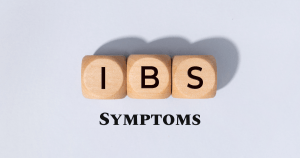What is Irritable Bowel Syndrome (IBS)?
Irritable Bowel Syndrome (IBS) is one of several functional gastrointestinal disorders that affects the large intestine. Symptoms of IBS can include abdominal pain, bloating, constipation, diarrhoea and changes in bowel habits. These symptoms vary from person to person and may come and go.
What is IBS Hypnotherapy (Gut-Directed Hypnotherapy)?
IBS Hypnotherapy, also known as Gut-Directed Hypnotherapy, is an evidence-based, powerful treatment for IBS. Its effectiveness has been proven through rigorous clinical trials, showcasing its capacity to provide lasting relief from IBS symptoms. This therapy has been particularly successful in managing chronic IBS cases where other treatments have only had limited benefits.
How Does Gut-Directed Hypnotherapy Work for IBS?
Gut-Directed Hypnosis works by focusing on the gut-brain axis, which plays a crucial role in IBS. The gut-brain axis refers to the complex communication network between the brain and the digestive system. Regardless of whether you’ve eaten or not, your brain continuously receives information about your digestive tract activities through your nervous, hormonal, and immune systems. It then processes these signals and sends feedback to the digestive tract, influencing digestion and absorption.
Under normal circumstances, we remain unaware of these background processes. However, in IBS, the brain heightens its response to signals from the large bowel, alerting the conscious mind. This sensitised brain then sends incorrect signals back to the intestines, resulting in pain and altered bowel habits. These physical symptoms often induce emotional distress, fueling a vicious cycle of worsening symptoms.
Clinical hypnosis employs visualisation, hypnotic language, and suggestion to decrease the brain’s subconscious sensitivity to messages from the digestive system. This approach enables the brain to reinterpret and reframe these messages, making them less distressing and less emotion-inducing. As a result, pain is reduced, and normal gut function is restored. Moreover, the relaxing effects of hypnosis alleviate stress and anxiety, which can otherwise exacerbate the emotional distress often experienced with IBS.

How Effective Is Hypnotherapy For IBS? Key Research Findings
Gut-Directed Hypnotherapy has emerged as one of the most effective treatments for IBS. Clinical research supports this claim, demonstrating that a significant proportion of patients experience positive outcomes after undergoing hypnotherapy.
One of the most cited studies in this field comes from Professor Olafur Palsson, a renowned psychologist and researcher. In his 2006 study, Palsson found that more than 80% of IBS patients experienced an improvement in their symptoms after undergoing a course of Gut-Directed Hypnotherapy.
A study by Gonsalkorale et al (2003) also supports the effectiveness of IBS hypnotherapy. In this research study, 71% of patients who underwent hypnotherapy experienced a positive response not only in terms of symptom relief but also an overall improvement in their condition.
These clinical research studies are just two of many that highlight the remarkable success rate of hypnotherapy as a viable and effective treatment option for those suffering from IBS.
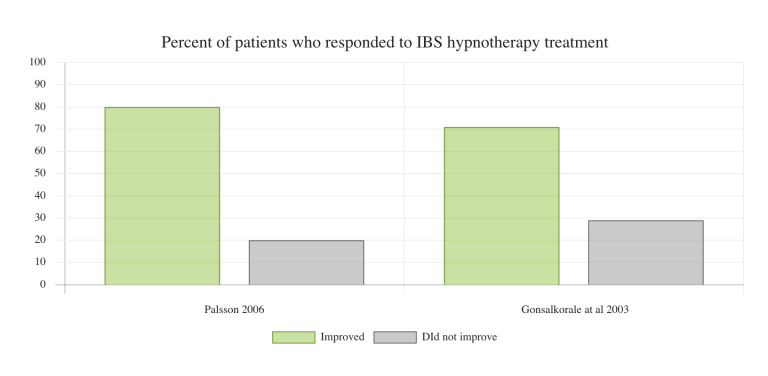
How Long Do The Benefits of Hypnotherapy For IBS Last?
Research suggests that IBS symptom relief can last for several years. One study found that 73% of IBS patients who underwent hypnotherapy experienced a significant improvement in IBS symptoms that lasted, on average, four years, but in some patients, as long as seven years. (Lindfors et al, 2012)
In another study, 81% of patients who initially responded to hypnotherapy were still better five years later, and the remaining 19% experienced only a slight reduction in the improvement of symptoms. (Gonsalkorale et al, 2003)
So, the benefits of hypnotherapy for IBS last for years. In the small minority of patients, when IBS flares again, the symptoms are very mild.
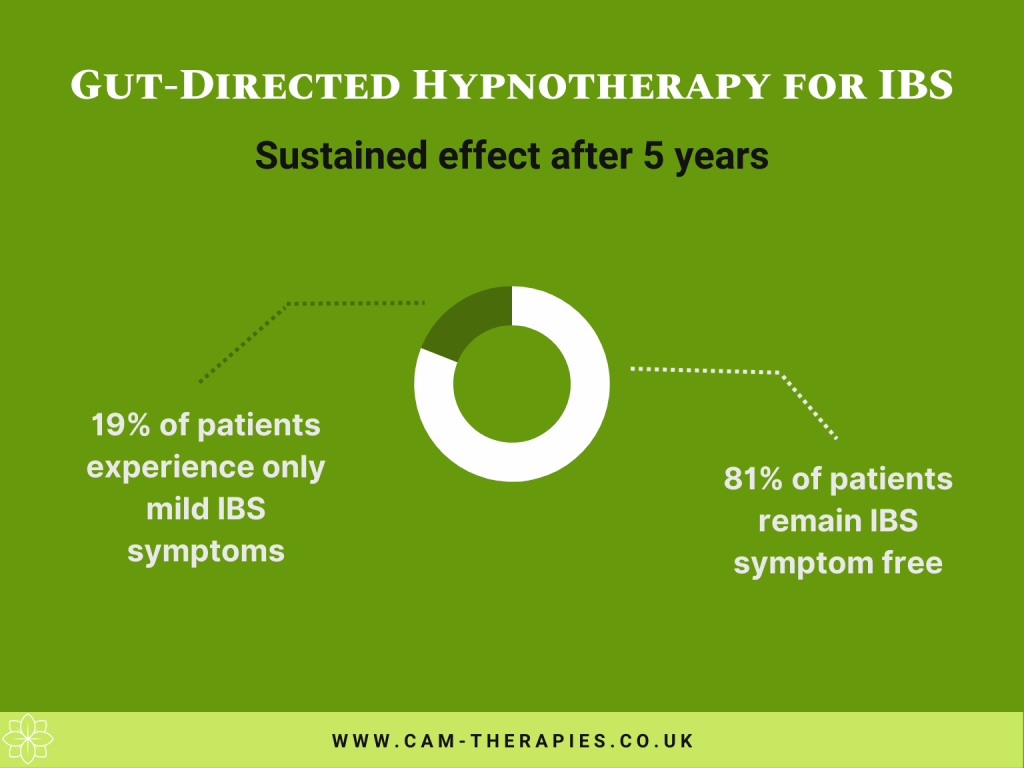
Is Hypnotherapy a Formally Recognised Treatment For IBS?
IBS hypnotherapy is recognised and recommended by many authoritative international medical bodies, including:
The British Society of Gastroenterology
The UK National Institute for Health and Care Excellence (NICE)
The American Gastroenterological Association
The American College of Gastroenterology
The Canadian Association of Gastroenterology
The Japanese Society of Gastroenterology
- World Gastroenterology Organisation
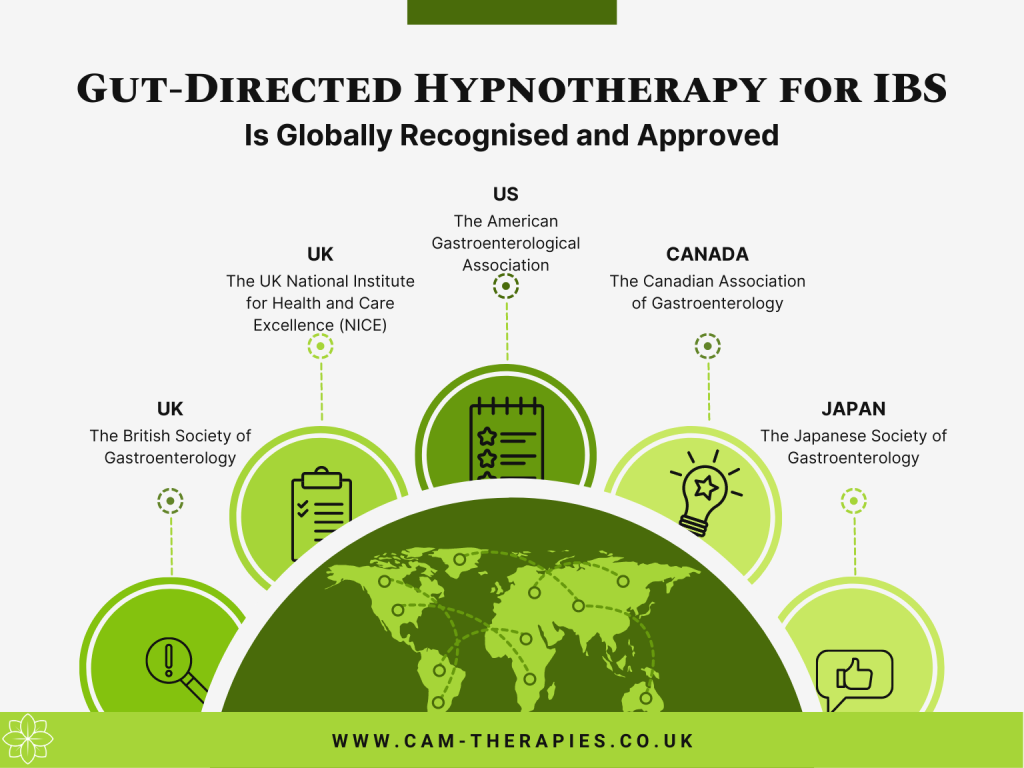
Who Can Benefit From IBS Hypnotherapy?
Hypnotherapy is a suitable treatment option for a diverse range of IBS patients, regardless of their symptom severity or the duration of their condition. Its effectiveness has been demonstrated across various demographics and circumstances, including:
-
Adults and children
-
Individuals experiencing severe IBS symptoms
-
Patients who haven’t responded to other IBS treatments
-
Those with low hypnotisability (that is, people who do not enter a full trance-like state and who are only able to experience a partial level of being hypnotised)
This versatile approach offers a therapeutic solution for individuals struggling with IBS, catering to their unique needs and situations.
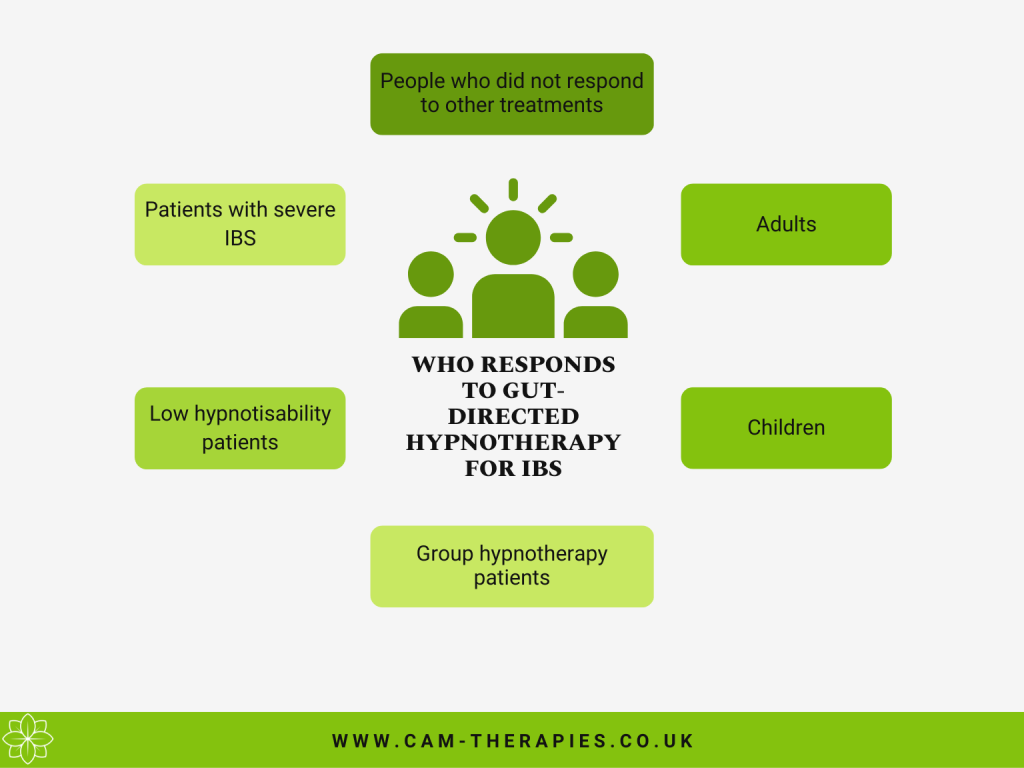
Additional Benefits of Hypnotherapy for IBS
Reduced anxiety and stress
Gut-Directed Hypnotherapy has been shown to alleviate anxiety and stress related to IBS, breaking the negative feedback loop that can exacerbate IBS symptoms (Donnet et al, 2022).
Improved digestive function and nutritional status
By promoting healthy eating habits, Gut-Directed Hypnotherapy helps restore normal digestive function in IBS patients, leading to better nutrient absorption and reduced nutritional deficiencies.
Enhanced sleep quality
IBS-related discomfort often contributes to poor sleep quality. As IBS symptoms improve through hypnotherapy, patients experience better sleep, which in turn further reduces discomfort, elevates mood and energy levels, and boosts overall well-being.
Increased productivity
IBS can impede concentration and productivity. Research indicates that IBS sufferers experience a 21% decline in work productivity, equivalent to a loss of one work day a week (Dean et al, 2005). As hypnotherapy helps alleviate IBS symptoms, it positively impacts productivity, allowing patients to work more efficiently and effectively.
Increased self-confidence
IBS can negatively affect self-confidence due to its impact on daily activities, such as socializing or exercising. Hypnotherapy helps IBS patients regain confidence, allowing them to enjoy activities they once loved and feel more in control of their lives.

How does IBS hypnotherapy compare to other IBS treatments?
Hypnotherapy vs low FODMAP diet
Both approaches address the underlying causes of IBS but from different angles. Hypnotherapy targets mind-gut communication, while the Low FODMAP diet focuses on reducing specific carbohydrates linked to digestive symptoms. The Low FODMAP diet can be effective but challenging to follow, whereas hypnotherapy is more flexible, allowing patients to enjoy their favourite foods while reducing IBS symptoms. Research shows hypnotherapy is as effective as the Low FODMAP diet, making it a viable alternative treatment.
Gut-Directed Hypnotherapy vs pharmacological treatments
IBS medication fails to work in up to 80% of patients.(Dong et al, 2019) In fact, many drugs, when tested in randomised controlled trials, perform barely better than a placebo.(Bosman et al, 2021)
Few that do have some positive effects are associated with unpleasant side effects. Furthermore, none of the pharmaceutical drugs cure IBS. They merely reduce IBS symptoms for as long as you take them.
Gut-Directed Hypnotherapy, on the other hand, is a non-invasive and drug-free IBS treatment that has long-lasting beneficial effects. It teaches IBS sufferers to control their IBS symptoms by reducing the brain’s sensitivity to IBS triggers.
Gut-Directed Hypnotherapy has been shown to perform better than IBS medication without any of the related side effects. In addition, IBS hypnotherapy has been shown to improve other IBS-related symptoms, such as fatigue, insomnia, depression, and anxiety.
Gut-Directed Hypnotherapy vs Cognitive Behavioral Therapy
Both Gut-Directed Hypnotherapy and Cognitive Behavioural Therapy (CBT) can successfully treat IBS symptoms. However, each therapy takes a distinct approach. CBT aims to modify IBS patients’ thoughts and behaviours related to their symptoms, while Gut-Directed Hypnotherapy targets the underlying central nervous system response to IBS triggers. These unique methods offer patients two effective options for managing their IBS symptoms.
Hypnotherapy vs relaxation and stress reliving therapies
Though stress and relaxation therapies are often recommended for IBS treatment, a recent meta-analysis found them to be ineffective. In contrast, the same study concluded that hypnotherapy is an effective and long-lasting treatment for IBS symptoms (Black et al, 2020).
Is Virtual Hypnotherapy for IBS as Effective as Face-to-Face?

Online hypnotherapy for IBS is as effective as face-to-face sessions. A study published in the International Journal of Clinical and Experimental Hypnosis in 2019 found that there was no statistically significant difference between virtual hypnotherapy and face-to-face hypnotherapy; both groups of patients reported improvements in IBS symptoms. (Hasan et al, 2019)
Virtual hypnotherapy has the advantages of being more convenient and flexible to fit around your lifestyle, not needing you to leave home and potentially feeling more comfortable in your own environment.
What Qualifications Are Needed to Practice IBS Hypnotherapy?
Choosing the right Gut-Directed Hypnotherapist can impact the success of your IBS treatment. This guide will provide you with essential criteria to consider when selecting a skilled professional to help you manage your IBS symptoms.
Specialist training in evidence-based Gut-Directed Hypnotherapy methods
It is crucial that your chosen hypnotherapist is trained and approved in at least one, but ideally all three, leading Gut-Directed Hypnotherapy methods:
-
The North Carolina Approach
-
The Manchester Approach
-
The Bremner Method
Each method varies in its approach, and identifying the most suitable method for each patient is crucial for successful treatment. Ensure that the hypnotherapist can provide evidence of their training and qualifications in these techniques.
Hypnotherapy training and qualifications
Understanding the different types of hypnotherapists is crucial when seeking treatment for complex health issues. While all hypnotherapists can label themselves as clinical or medical, only those with specific, statutorily regulated healthcare qualifications are eligible to join The British Society for Clinical and Academic Hypnosis (BSCAH).
These healthcare qualifications encompass professions such as osteopathy, dentistry, psychology, and more. Hypnotherapists with these credentials can safely diagnose and treat complex health issues like IBS.
On the other hand, hypnotherapists without these qualifications may not possess the necessary expertise to effectively and safely address complex health issues.
In the UK, only hypnotherapists with the required medical training and membership in statutorily regulated health professions can become members of BSCAH. This distinction is essential when seeking treatment for IBS, as it ensures that your chosen hypnotherapist has the appropriate background and knowledge to address your condition safely and effectively.
To identify a properly trained medical hypnotherapist, be sure to:
Confirm your hypnotherapist’s background qualifications and ensure they are registered with one of the UK’s 10 healthcare regulators. You can find the links to each regulator here: https://www.professionalstandards.org.uk/what-we-do/our-work-with-regulators/find-a-regulator
Verify their registration with The British Society for Clinical and Academic Hypnosis (BSCAH), which only accepts medically trained practitioners: https://bscah.co.uk/
Specialist memberships
Selecting a Gut-Directed Hypnotherapist who is a member of specialist interest groups or societies can provide additional assurance of their expertise and dedication to staying current in the field. In the UK, some Gut-Directed Hypnotherapists may be members of the following specialist groups:
British Society of Clinical & Academic Hypnosis (BSCAH) Neuro-Gastroenterology Interest Group
Primary Care Society for Gastroenterology
Membership in these organizations offers advantages such as access to the latest developments in the field, ongoing training, opportunities for case discussions with other experts, and adherence to strict professional standards and ethics.
Experience treating IBS patients
It is important to choose a Gut Directed Hypnotherapist who has a proven track record in successfully treating IBS patients.
Virtual hypnotherapy for IBS vs. in-person IBS hypnotherapy
Both virtual and in-person hypnotherapy sessions have been shown to be effective in treating IBS. The choice between these formats largely depends on your personal preference, comfort level, and accessibility to an experienced IBS hypnotherapist in your area. Virtual sessions provide convenience and the opportunity to work with experts who may not be local, while in-person sessions may offer a more personal and interactive experience. When selecting a hypnotherapist, consider the advantages of both formats and determine which option best suits your needs and lifestyle.
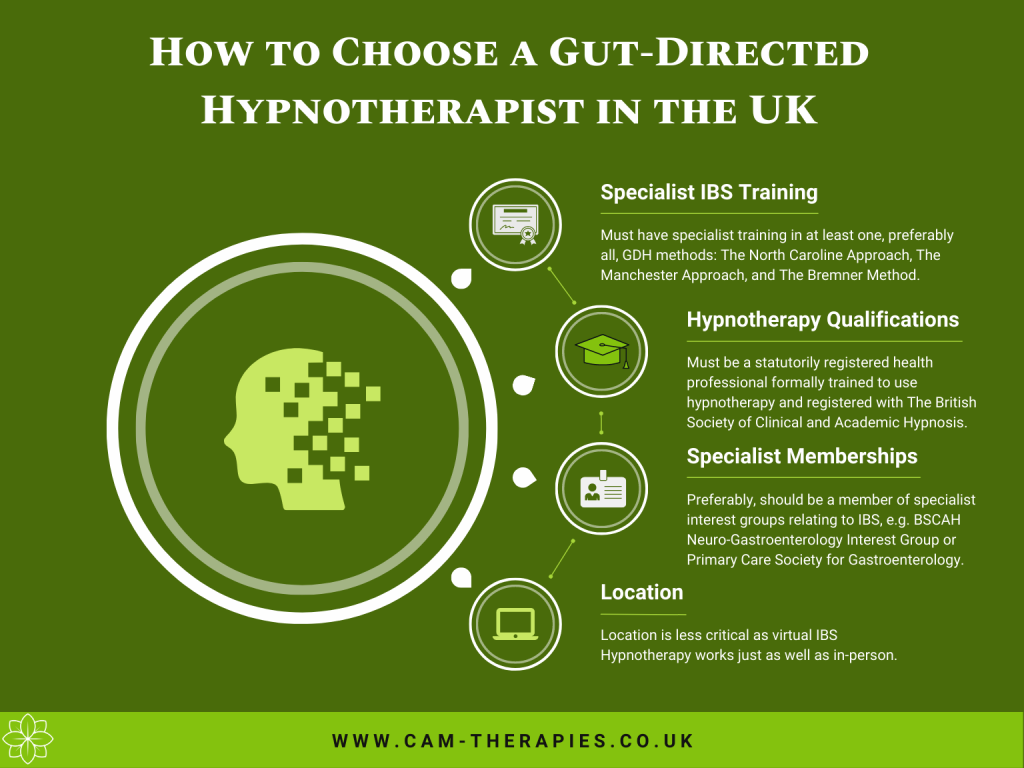
The Gut-Directed Hypnotherapy Treatment Process
The Gut-Directed Hypnotherapy treatment process is designed to help patients with Irritable Bowel Syndrome (IBS) manage their symptoms and regain control over their gut function. In this section, we will outline the typical course of treatment, including the initial consultation and subsequent therapy sessions.
The Initial Consultation:
A typical IBS hypnotherapy course begins with an initial consultation, during which the therapist will:
-
Gather a detailed medical history
-
Assess IBS symptoms and their impact on the patient
-
Explain IBS symptoms and the hypnotherapy treatment process
This consultation allows the therapist to tailor the treatment plan to the patient’s unique needs and ensure they understand the therapy process.
Treatment Sessions 1 to 2:
The first two treatment sessions primarily focus on the following:
-
Relaxation and hypnotic induction
-
Implementing relevant ego-strengthening techniques
During these initial sessions, patients will experience hypnotic induction and learn to achieve a focused state of relaxation, laying the groundwork for the subsequent gut-directed techniques.
Treatment Sessions 3 to 12:
In the following sessions, the hypnotherapist will:
-
Incorporate gut-directed techniques for control and normalization of gut function (e.g., hand warmth on the abdomen, imagery, imaginal rehearsal, direct suggestions)
-
Modify suggestions and hypnotic techniques as necessary to address each patient’s unique needs
These techniques aim to help patients gain control over their gut function and alleviate IBS symptoms. The therapist will adapt the methods as needed to ensure optimal results.
Daily Practice Throughout the Course of Treatment:
To reinforce the techniques learned during the sessions and empower patients to take control of their IBS symptoms, the therapist will:
-
Encourage daily practice with a recorded audio
This daily practice reinforces the lessons learned during the sessions and helps to further ingrain the techniques into the patient’s routine.
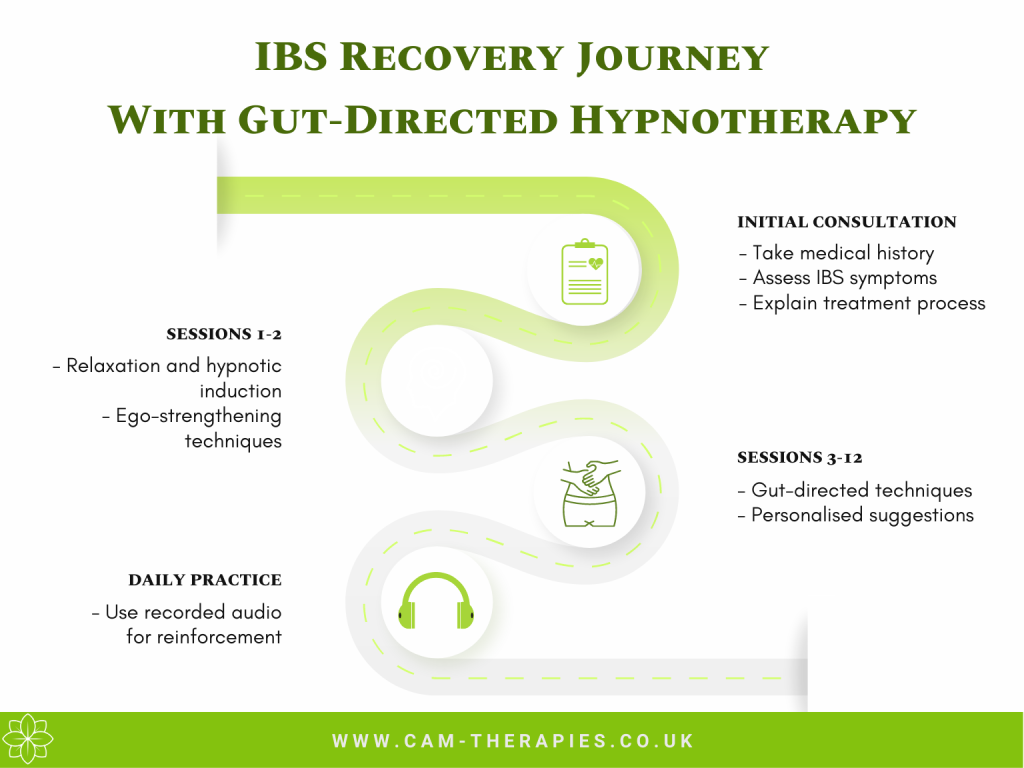
Summary
Gut-Directed Hypnotherapy is a powerful technique that uses hypnosis and visualisation to reprogramme the disrupted malfunctioning gut-brain connection to reduce gut sensitivity and relieve IBS symptoms. Gut-Directed Hypnotherapy:
-
Is scientifically proven
-
Is long-lasting
-
Has no side-effects
-
Relieves physical and emotional symptoms
-
Works in severe IBS cases
-
Works for those patients who failed to respond to other treatments.
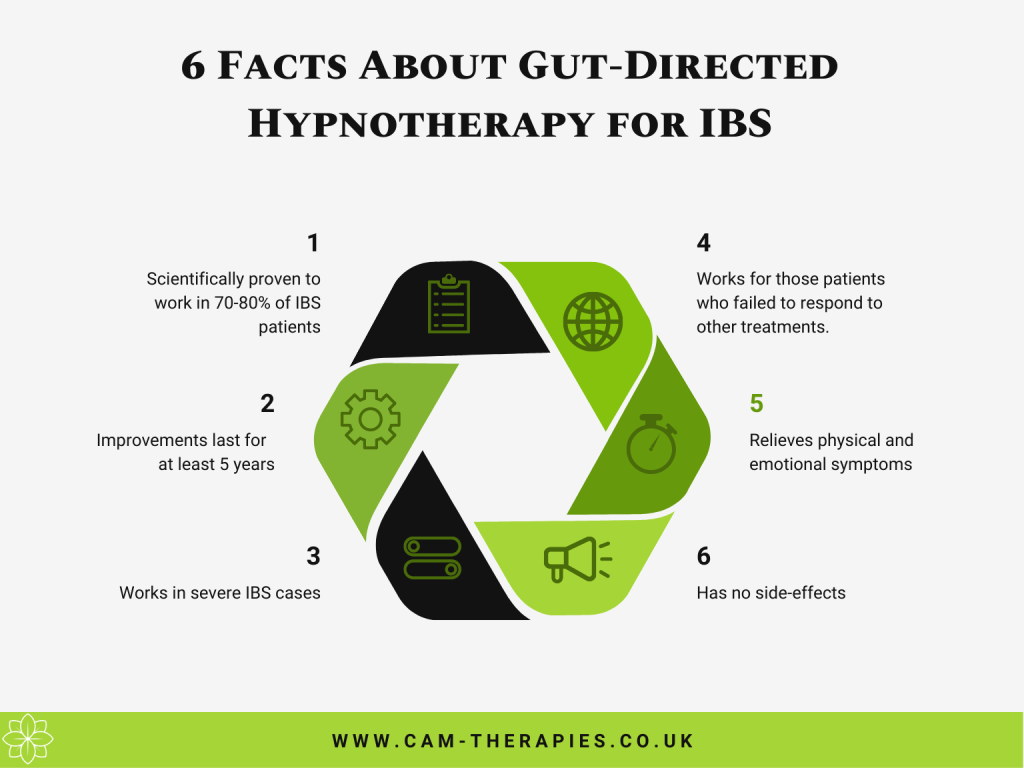
FAQs
What are the risks associated with IBS Hypnotherapy?
There are no risks associated with IBS hypnotherapy. Research shows that hypnotherapy is safe and effective if done by a qualified clinical hypnotherapist.
How long does a hypnotherapy session usually last?
An IBS Hypnotherapy session typically lasts between 30 minutes to an hour, depending on the approach of the hypnotherapist and the needs of the patient.
Do I need to have a certain level of hypnotizability to benefit from hypnotherapy for IBS?
No. Research shows that 85% of people can get into at least a light trance state, which is enough to see a benefit from hypnosis for IBS.
Can hypnosis be used as an adjunct to other forms of treatment for managing IBS?
Yes, Gut-Directed Hypnotherapy can be used as an adjunct to other forms of IBS treatment. Indeed, research shows that hypnotherapy may improve patients’ response to other interventions, such as medication.
References and Further Reading
Black, C.J., Thakur, E.R., Houghton, L.A., Quigley, E.M.M., Moayyedi, P., Ford, A.C., 2020. Efficacy of psychological therapies for irritable bowel syndrome: systematic review and network meta-analysis. Gut 69, 1441–1451. https://doi.org/10.1136/gutjnl-2020-321191
Dean, B.B., Aguilar, D., Barghout, V., Kahler, K.H., Frech, F., Groves, D., Ofman, J.J., 2005. Impairment in work productivity and health-related quality of life in patients with IBS. The American Journal of Managed Care 11, S17-26.
Dong, Y., Baumeister, D., Berens, S., Eich, W., Tesarz, J., 2019. High Rates of Non-Response Across Treatment Attempts in Chronic Irritable Bowel Syndrome: Results From a Follow-Up Study in Tertiary Care. Front. Psychiatry 10, 714. https://doi.org/10.3389/fpsyt.2019.00714
Donnet, A.-S., Hasan, S.S., Whorwell, P.J., 2022. Hypnotherapy for irritable bowel syndrome: patient expectations and perceptions. Therap Adv Gastroenterol 15, 175628482210742. https://doi.org/10.1177/17562848221074208
Flik, C.E., Laan, W., Zuithoff, N.P.A., van Rood, Y.R., Smout, A.J.P.M., Weusten, B.L.A.M., Whorwell, P.J., de Wit, N.J., 2019. Efficacy of individual and group hypnotherapy in irritable bowel syndrome (IMAGINE): a multicentre randomised controlled trial. The Lancet Gastroenterology & Hepatology 4, 20–31. https://doi.org/10.1016/S2468-1253(18)30310-8
Gonsalkorale, W.M., Miller, V., Afzal, A., Whorwell, P.J., 2003. Long term benefits of hypnotherapy for irritable bowel syndrome. Gut 52, 1623–1629. https://doi.org/10.1136/gut.52.11.1623
Hasan, S.S., Pearson, J.S., Morris, J., Whorwell, P.J., 2019. SKYPE HYPNOTHERAPY FOR IRRITABLE BOWEL SYNDROME: Effectiveness and Comparison with Face-to-Face Treatment. International Journal of Clinical and Experimental Hypnosis 67, 69–80. https://doi.org/10.1080/00207144.2019.1553766
Lindfors, P., Unge, P., Nyhlin, H., Ljótsson, B., Björnsson, E.S., Abrahamsson, H., Simrén, M., 2012. Long-term effects of hypnotherapy in patients with refractory irritable bowel syndrome. Scandinavian Journal of Gastroenterology 47, 414–421. https://doi.org/10.3109/00365521.2012.658858
Lindfors, P., Unge, P., Arvidsson, P., Nyhlin, H., Björnsson, E., Abrahamsson, H., Simrén, M., 2012. Effects of Gut-Directed Hypnotherapy on IBS in Different Clinical Settings—Results From Two Randomized, Controlled Trials. American Journal of Gastroenterology 107, 276–285. https://doi.org/10.1038/ajg.2011.340
Palsson, O.S., 2006. Standardized Hypnosis Treatment for Irritable Bowel Syndrome: The North Carolina Protocol. International Journal of Clinical and Experimental Hypnosis 54, 51–64. https://doi.org/10.1080/00207140500322933
Whorwell, P., 2017. Take control of your IBS: the complete guide to managing your symptoms. Vermilion, London.







